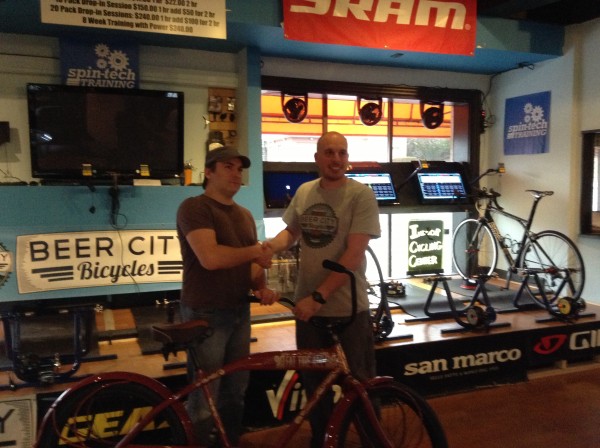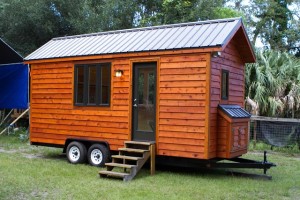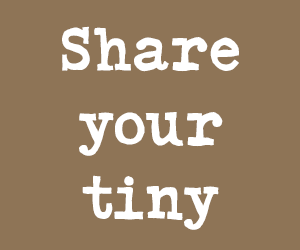This post contains affiliate links.
My idea for this post on the tiny house movement and building social infrastructure for it took a few twists and turns before it became the finished product you’re about to read.
It started with this video, featuring Dee Williams of Portland Alternative Dwellings and the folks from Boneyard Studios in DC.
Something that Dee said really stuck with me, though I imagine that most just let the statement go by.
She said, “the relationships that I have developed by living small have really surprised me. All of a sudden I’ve got a different relationship with the sun, I’ve got a different relationship to my friends, a different relationship with the food co-op, and the library and the Laundromat and all of these spaces and resources that I don’t think I put too much thought into before and now all of a sudden those people and places they make my life possible and they give me a sense of home.”

Dee Williams at Tiny House Workshop
I started thinking about how I have had a very similar experience. Since moving into the tiny house, my life revolves around even more social activities than it did when we lived in an apartment.
We make an effort to leave our mountain several times a week. One of our favorite hangout spots is Bar of Soap, a Laundromat bar here in Asheville. Every time I go in there I think “what a great freaking idea!”
Even in our house or the apartment, I hated doing laundry. I hated folding laundry. I would let the clean, dry clothes sit in baskets until I needed to pull them out and wear them again.
Going to Bar of Soap made me look forward to laundry. We get to hang out with people we’ve gotten to know and drink delicious craft beer and the chore goes by surprisingly quick.
Then I heard this story on NPR and it made me think about Dee’s words and what they really mean.
In the story, sociologist Eric Klinenberg suggests that social infrastructure in the wake of natural or man-made disasters may be the key to better survival.
As I understand his premise, when we isolate ourselves we are cutting off a very important part of what it means to be human.
We are intended to be social creatures and by being social in good times we create a community that is there in bad times. This is why communities should have festivals and celebrations and be there for each other.

Matt and Beer City Bicycles. Photo by Laura M. LaVoie
Just this weekend, Matt and I found ourselves very much a part of this kind of community.
A week ago we entered a raffle for a New Belgium Brewery Fat Tire bicycle. We were told it was to benefit a local bike rider who had been hit by a car.
He had to have extensive medical care and they were raising money for him. We bought one $5.00 raffle ticket.
On Saturday Matt got a call from the bike shop and he had won the raffle. While we were there we gave some more money to donate to the medical bills.
This was community in action and it made us feel great about choosing this city as our home.
I realized that tiny houses and proposed tiny house communities, such as Jay Shafer’s Napoleon Complex or the mini tiny house community idea that Alex shared right here at THT, could be a catalyst to re-discovering these kinds of communities.
And think about the example of the Laundromat or even the bike shop. Not only do they provide a resource for people like us but we are also supporting local businesses, like Bar of Soap and Beer City Bicycles in Asheville, that are very much a part of the community.
This post contains affiliate links.
Laura LaVoie
Latest posts by Laura LaVoie (see all)
- Top 5 Things to do on a Rainy Day in Your Tiny House - October 20, 2013
- Top 5 Reasons I Love My Tiny House in the Fall - September 24, 2013
- 3 Tips You Should Know Before Building From a Tiny House Builder - September 18, 2013






This is very interesting… I really am eager to see if Jay’s plan for a tiny home community comes to fruition. I’ve read good things about pocket neighborhoods created by Ross Chapin. I used to live on a cul-de-sac, only three blocks from where I live now. I think because it felt isolated and contained, it was it’s own little community in the midst of a big city. We knew all the neighbors, there were neighborhood parties and events. When we moved three blocks away we effectively left that community, even though we didn’t emotionally want to… and because we now live on a through street for traffic, there is much less sense of community here. We know very few neighbors. It’s odd what things can make up a community and what things make it difficult to create one.
Thanks for sharing DJ!
Good article, Laura. I like your realization of the social aspects of going to the laundromat. If I had the physical ability to haul my stuff around alone, I might consider giving up the luxury of having a home washer-dryer.
Thanks Carolyn! I agree but it sounds like Laura’s lucky to have such a cool laundromat in her area. Even though I’m sure it’s a drive. Definitely sounds like a really cool/unique place.
It is a bit of a drive, but we use that time to be social. When we are on the mountain everything is a 20 to 30 minute drive. We try to combine errands and only drive one car.
I figured it was a bit of a drive but I think it’s still cool that it’s at least that close when you’re out in the mountains off grid 🙂
To Alex: we are lucky to live so close to Asheville.
😀
Let me start off by telling you a million reasons why community building just doesn’t work. KIDDING.
Great post. It’s this kind of in-depth, unexpected, well-written analysis+observation that makes me proud of be a part of *this* community. Joel Salatin (farmer extraordinaire) says that when you look for land, you should first look for community, not just if there’s water and a view.
Thanks Jessica, nicely put!
Probably the best tiny house community I’ve found is liveaboard cruising sailors who I’ve found hard to beat at helping each other as our lives depend on such living on thw water, even if you have never met before.
Most sailboats are only 60-120sq’ cabins so really are tiny which will teach you a lot about what is needed and what isn’t.
Ditto regarding the live aboard cruising community! I have never met a mariner who wasn’t willing to help, lend tools, books, time and advice. Find a live aboard marina and enjoy a tiny, floating lifestyle.
You find that social atmosphere more around resort towns where people share the same interests and the businesses cater to more unique and varied tastes.
There are small house and off-grid communites around these areas usually like a KOA or RV park community that has a central theme like biking, adventuring, etc.
LaMar